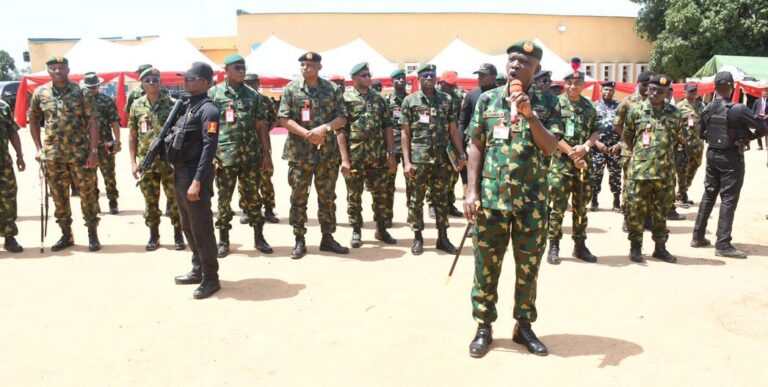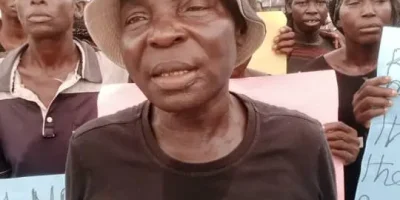By Abiodun OBA
The Chief of Army Staff, Lt Gen Taoreed Lagbaja has affirmed that as professional soldiers, the Nigerian Army will adapt to the evolving nature of the battleground by establishing innovative procedures strategies, and tactics for effective engagement in its operations.
General Lagbaja affirmed at the Chief of Army Staff’s Annual Lecture Series at the Nigerian Army Resource Centre (NARC), Abuja, with the theme “The Role of the Military in the Protection of Nigeria’s National Interest and Security”.
According to him, exclusive reliance on the military to solve crisis situations resulting into armed conflict, insurrection and which create tension within the state may not be the best option in confronting the myriads of security challenges confronting the country.
He advised, “Attending early to issues early on will nip grievance in the bud and prevent Imbroglio from developing into a major conflict.”
Lagbaja said the causes of armed conflicts must be addressed while the military plays its roles, pointing out that the military as an institution of the state plays a crucial role in the performance of the functions of the state towards its citizens.
He noted that since the end of the Cold War, intra-state conflicts have been on the ascendancy due to the activities of non-state actors, especially violent entities like the resistance army in Uganda and Al-Shabab in Somalia, Boko Haram and Islamic State West African Province ISWAP in Nigeria creating a volatile, unpredictable, complex and ambiguous environment.
These developments according to Lt General Lagbaja have led to the Military in Nigeria being deployed in virtually all the 36 states of the federation including the FCT.
He said, “It is clear that national security is fused with national interest. As a country we seek a secure state as part of the national interest. It is therefore in seeking to secure and protect the country, that the military is inadvertently engaged in the protection of the interest of the country which dictates the defence policy.
“The AFN has played and still plays a pivotal role in safeguarding the national interest and security of the nation. The national interest rooted in the fundamental desire for survival and security remains a paramount consideration.
Against this backdrop, Gen Lagbaja opined that the military while addressing defense economics must frame capability requirements and push them to a political master to sort for the funding of training for adaptation since according to him, “Policies are accepted without reservation and strategies to achieve the objectives are developed.
He said the Armed Forces of Nigeria (AFN) doctrine at the joint operations level and service level is reviewed periodically taking into consideration lessons learnt noting that the military has challenged itself to develop holistic requirements given the level of engagement using appropriate tools of defence economics.
“This will assist in focusing the government on the armed forces of Nigeria’s requirement in special phases of prioritization.
Towards this end, he said, “The AFN has entrenched unity of command thereby highlighting the message and treatment of issues with minimal discrepancies.
“The operational and tactical level commanders are being challenged to innovatively and transparently manage the inadequate resources placed under their command, with emphasis on integrity, honour and performance.
“The military must continue to train and retrain consistently, updating and resourcing.
He affirmed that on their part as professional soldiers, they will adapt to the evolving nature of the battleground by establishing innovative procedures strategies, and tactics for effective engagement in their operations.
In his goodwill message, Minister of Defence, Mohammed Badaru Abubakar, reassured participants that President Bola Tinubu is passionate about the development of security in Nigeria noting that President Tinubu will definitely do his best to work on those challenges mentioned at the seminar.
In his remarks, Ambassador Babagana Kingibe who is a member of NARC BOT, thanked the COAS for the wide-ranging coverage of the lecture both from academic, and professional point perspectives. He said he is particularly happy that the COAS avoided defining terms from a narrow perspective.
Chairman of the Police Service Commission, Retired IGP Solomon Arase sympathized with the military on the ill-fated incident that occurred in Okuama, Delta State, noting that the situation whereby soldiers were deployed in communities across the country is not supposed to be the situation as the Police is in charge of Internal security.
He said the police are supposed to step into some of the issues that the Nigerian Army is currently dealing with presently but lamented the lack of funds for the recruitment of officers into the Nigeria Police Force.
On the creation of state police, Dr Arase commended the Chief of Army Staff for urging stakeholders to be careful when considering state policing.
The DG, of the Nigerian Army Resource Centre, Major General Garba Wahab (Rtd) in his remarks stressed that the Maiden Edition of the Chief of Army Staff (COAS)’s Annual Lecture Series is meant to look at national issues critically adding, “This is the reason the stakeholders decided to start with the Chairman Board of Trustees BOT that is the COAS to look at The Role of the Military in the Protection of Nigeria’s National Interest.
Present at the event were the Minister of Defence, Mohammed Badaru Abubakar, Ambassador Babagana Kingibe who is also a member of NARC BOT, representatives of Service Chiefs, representative of Lt Gen F Yahaya (rtd) former COAS, Chairman, Police Service Commission, Reps of the heads of Security Agencies, DGs of various Federal agencies, PSOs from Defence and Service Headquarters, senior military officers, both serving and retired.








Comments